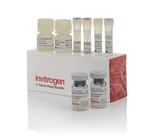FIGURE: 1 / 4
Human IL-8 ProQuantum Immunoassay Kit
(A) Antibody-antigen binding: Antibodies bind to two separate epitopes on the antigen (during a 1-hr incubation), which brings the two conjugated oligonucleotides into close proximity. (B) Ligation and amplification of signal (in a qPCR instrument): DNA ligase and a third splint oligonucleotide connector are added to ligate the two ends of the conjugated oligonucleotides, creating a 100-base DNA template. Once the ligase is inactivated at 95°C, the sample is amplified through 40 cycles of annea... View More




Product Specifications
Analytical sensitivity
Assay range
Sample type/volume
Hands-on time
Time-to-result
Homogenous (no wash)
Instrument
Product size
Contents
Antibody-Conjugate A
Antibody-Conjugate B
Antibody-Conjugate Dilution Buffer
Standard
Master Mix
Ligase
Shipping conditions
Storage
Protein name
Species (tested)
Assay kit format
Label or dye
About This Kit
The ProQuantum Human IL-8 Immunoassay Kit is designed to provide highly sensitive quantitative measurements of human IL-8 protein in small sample volumes. Utilizing proximity ligation assay (PLA) technology, the assay combines the analyte specificity of high-affinity antibody-antigen binding with the signal detection and amplification capabilities of real-time PCR to achieve a simple yet powerful next-generation protein quantitation platform. A user-friendly workflow combined with intuitive Cloud-based software for analytics enables sample-to-answer in just 2 hours.
• High sensitivity-detect low levels of protein with greater sensitivity than traditional methods
• Broad dynamic range-≥5 logarithmic units, minimizing sample dilutions to ensure they fall within the range
• Small sample consumption-use 2-5 µL of sample (compared to 75 µL for triplicate wells with other methods)
• Fast, easy workflow-2 hours from sample to answer, with no wash steps
• No proprietary instrument to purchase-runs on any real-time PCR instrument
ProQuantum immunoassays utilize a matched pair of target-specific antibodies, each conjugated to a DNA oligonucleotide. During antibody-analyte binding, the two DNA oligos are brought into close proximity, which allows for ligation of the two strands and subsequent creation of a template strand for amplification. This platform leverages the sensitivity and large dynamic range of Applied Biosystems TaqMan real-time PCR technology (Figure 1).
The assay workflow is fast and easy-2 steps in 2 hours. There are a total of 7 components in each kit (Figure 2). First, mix the antibody-conjugates, dilute the sample, and create the standard curve in a working plate. Then, using a multi-channel pipette, add the antibody-conjugates and sample (or standard) into the wells of a PCR plate and incubate for 1 hour. Combine the master mix and ligase and add to the wells of the PCR plate, then run the plate on any qPCR instrument. After the run is complete, import the results file into the ProQuantum cloud-based software at https://apps.thermofisher.com/apps/proquantum. Using this software, the data can be analyzed easily to obtain protein concentration values. The software allows you to set up standard curves, design plate layouts, set up customized assay instructions, and obtain robust statistical group-wise comparisons.
Interleukin 8 (IL-8, CXCL8) is a 72 amino acid pro-inflammatory factor which belongs to the CXC subfamily of chemokines, and are bound by the cell surface receptors IL-8RA and IL-8RB. IL-8 functions as a chemoattractant and potent angiogenic factor. The expression and secretion of IL-8 can be induced by diverse inflammatory stimuli in many cells, including macrophages and endothelial cells. In endothelial cells, IL-8 is present in storage vesicles called Weibel-Palade bodies. IL-8, first isolated from osteosarcoma cells, contains the ELR-motif (N-terminal Glu-Leu-Arg amino acid sequence) and signals through the CXCR1 and CXCR2 receptors. Previous nomenclature for IL-8 includes neutrophil activating protein 1 (NAP-1), granulocyte chemotactic protein 1 (GCP-1), monocyte-derived neutrophil-activating peptide (MONAP) and protein 3-10C. IL-8 and ten other members of the CXC chemokine gene family form a chemokine gene cluster in a region mapped to chromosome 4q. Cancer studies have demonstrated a role for IL-8 in the angiogenesis and growth of tumours, and IL-8 is believed to play a role in the pathogenesis of bronchiolitis, a common respiratory tract disease caused by viral infection.
For Research Use Only. Not for use in diagnostic procedures. Not for resale without express authorization.
Bioinformatics
Gene aliases : CXCL8, GCP-1, GCP1, IL8, LECT, LUCT, LYNAP, MDNCF, MONAP, NAF, NAP-1, NAP1
Gene ID : (Human) 3576
Gene symbol : CXCL8
Protein Aliases : alveolar macrophage chemotactic factor I, beta endothelial cell-derived neutrophil activating peptide, beta-thromboglobulin-like protein, C-X-C motif chemokine 8, Chemokine (C-X-C motif) ligand 8, Emoctakin, GCP-1, Granulocyte chemotactic protein 1, IL-8, interleukin 8, Interleukin-8, lung giant cell carcinoma-derived chemotactic protein, lymphocyte derived neutrophil activating peptide, MDNCF, MONAP, Monocyte-derived neutrophil chemotactic factor, Monocyte-derived neutrophil-activating peptide, NAP-1, neutrophil-activating peptide 1, Neutrophil-activating protein 1, Protein 3-10C, small inducible cytokine subfamily B, member 8, T-cell chemotactic factor, tumor necrosis factor-induced gene 1
UniProt ID (Human) P10145

Performance Guarantee
If an Invitrogen™ antibody doesn't perform as described on our website or datasheet,we'll replace the product at no cost to you, or provide you with a credit for a future purchase.*
Learn more
We're here to help
Get expert recommendations for common problems or connect directly with an on staff expert for technical assistance related to applications, equipment and general product use.
Contact tech support